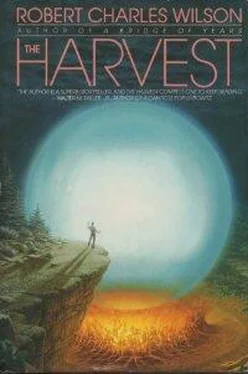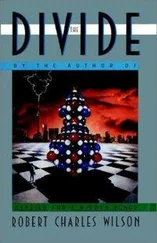Probably no one would recognize the signature of a campfire in Cheyenne. Much of the city was still smoldering. But he would have to be careful out on the rangelands where it would be easy to spot a man’s fire at night. There might be other people who hadn’t chosen the option of Ohio. There might be more like Colonel Tyler.
* * *
Matt was awake in the morning.
The black substance had left his hands. Kindle wondered where it had gone. Had it been absorbed by the body? Had it evaporated into the air? “Thirsty,” Matt said.
Kindle brought him some water. The skin on the doctor’s hands was pink and new.
“I dreamed about Beth,” Matt said. “I dreamed they fixed her.”
“Maybe they did,” Kindle said.
* * *
Matt helped him build the evening’s fire. They brewed coffee and sat huddled at the flickering warmth.
“I thought maybe you had gone over,” Kindle said. “Maybe you’d end up an empty skin, like everybody else.”
Matt shook his head: No, that wasn’t the decision he had made.
Kindle allowed the silence to grow to its natural length. The stars had come out tonight, all these bright Wyoming stars. He said, “I talked to Ohio.”
“Hooked up a radio?”
He nodded. “Their Helpers are working again. I gather they weren’t for a while. Everything went down when the Traveller Artifact left. Power went down. The Travellers had been running all the turbines and so forth, keeping electricity on line, I guess all over the country—all over the world. Now it’s back on. But only in Ohio, the man says, a certain perimeter around that encampment. And a few similar places on other continents.”
“A perimeter?”
“Not a fence. But I gather, if you stray too far, you’re on your own. No power, no water, no guarantees.”
“It’s a safe place,” Matt said.
“Eden,” Kindle said. “Can you think of a better name for it? Kind of a garden. Live there, you’re taken care of. God looks after you for your natural span. God makes the sun shine, God makes the grass grow.”
“They’re not God,” Matt said.
“Might as well be.”
“But only in Ohio,” Matt said. “Maybe only as long as the Artifact stays in orbit.”
“Artifact might not leave. Guy in Ohio says it’s not decided yet, according to the Helpers.”
“War in Heaven?”
“An argument, at least.”
Matt looked across the gray lawn of the capitol building, at the local Helper, their Helper—the pillar to which he had prayed. “If we talked to it—”
“It was alive for a while, Matthew, but I think it’s not anymore. I think if you want to talk to a Helper you have to go to Ohio.”
Matt nodded. Periodically, he looked at his hands—his new, raw hands.
He said, “You think I’m responsible for this?”
“For keeping the Artifact here?” Kindle shrugged. He had thought about this. “Who knows? We’re talking about the collective decision of ten billion souls—I don’t think Matthew Wheeler tipped the pot. But you walked into their debate, I think. Made them look at what they left behind. And maybe you weren’t the only one. Maybe the same scene got played out a thousand times, different places on the Earth. People saying: If you want to be God, show a little compassion. Or if you’re still human, some human compassion.”
“You blame me?”
“No.”
“But you don’t like it.”
“No.” Kindle sipped his coffee. It was hot and bitter. “No, I do not.”
* * *
Beth woke up groggy the next morning—groggy but well. There was only a pucker of healthy skin where the bullet had entered her chest.
She asked about Joey and Colonel Tyler. Matt explained, not gently because there was no gentle way to say this, what had happened.
She listened carefully but didn’t speak much after that.
She sat at the evening fire hugging herself and drinking coffee. The talk flowed around her silence like a river around a stone.
Periodically, her hand strayed to her right shoulder and touched her jacket above the place where her tattoo had been—where it remained, Matt corrected himself; the Helper had not taken it away. He supposed some wounds were easier to heal than others.
* * *
She slept that night curled around herself on a mattress on the floor of the camper.
In the morning they began the journey east, across the border from Wyoming into Nebraska.
Tom Kindle said he would ride along for a while. But only a while.
* * *
Nebraska was a half-and-half state—arid in the west, wetter in the agricultural east. Interstate 80 joined the Platte River east of the Kingsley Dam, and the Platte fed a valley of rich alluvial soil where acre upon acre of corn, beets, potatoes, and beans had grown wild and high in an empty springtime.
Matt drove most of the time. Tom Kindle’s leg was still bothering him; it tended to cramp after a time behind the wheel. So Matt drove through these empty agricultural towns, pretty little towns made ragged by a hard, windy winter: Brady, Gothenburg, Lexington, Kearny. Sometimes Kindle rode in the cab beside him; mostly it was Beth.
Out of Kindle’s earshot, Beth talked a little more about what had happened—and what might happen.
“They’re still inside us,” she said. “The—what are they called? Neocytes.”
He nodded.
“They’ll be with us for a long time.” He nodded again.
She said, “You know about this, too?”
“Yes.”
“Same as me? I mean… nobody told you, you just know it, right?”
“Right.”
“They’re inside us. But dormant. Not doing anything. Until…”
“You can say it,” Matt told her. There was a potent magic in saying things out loud.
“Until we die,” Beth said. “And then they’ll give us another chance to say yes. To go with them.” He nodded.
“Like heaven,” she said. “A little like.”
“And not just us. Everybody in that town on the river, that town in Ohio.”
Everybody in Eden, Matt thought.
They did some night driving.
It was Kindle who pointed out the line of division that had appeared on the orbiting Artifact, a dark equator on that bright circle.
“It’s dividing,” said Kindle, who had been talking on the radio again. “That’s what Ohio tells me. It’ll be two Artifacts, not one. One to go roving among the stars. One to stay here.”
“Like a custodian,” Matt said.
“Or a local god.” He gave Matt a long look. “You don’t seem surprised.”
He admitted, “I’m not.”
“You knew about it?”
“Yes.”
“How?”
He shrugged.
Kindle turned away. He watched the road pass. He said, “You’re not what you used to be.”
“Not entirely.”
“God damn,” Kindle said. It was not a particular lament. It wasn’t aimed at Matt. It was just a sad curse to rattle away in the chilly night air. “God damn.”
As wise as they were, the Travellers had come to the Earth with their own assumptions and for their own reasons. They were benevolent but clumsy giants; and the human polis, alone in orbit, began to tinker with certain changes the Travellers had made.
In the oceans, the population of Traveller phytoplankton dropped to a fraction of its earlier numbers. The work continued—there was still much excess C0 2to be bound into the sea—but it needn’t be done in a season, and it needn’t inject so much violent energy into the atmosphere.
Nor was it necessary to maintain power and water in every city on the Earth. That had been the Travellers’ fumbling reaction to the phenomenon of human obstinacy: the puzzling willingness of so many people to accept their own mortality.
Читать дальше












